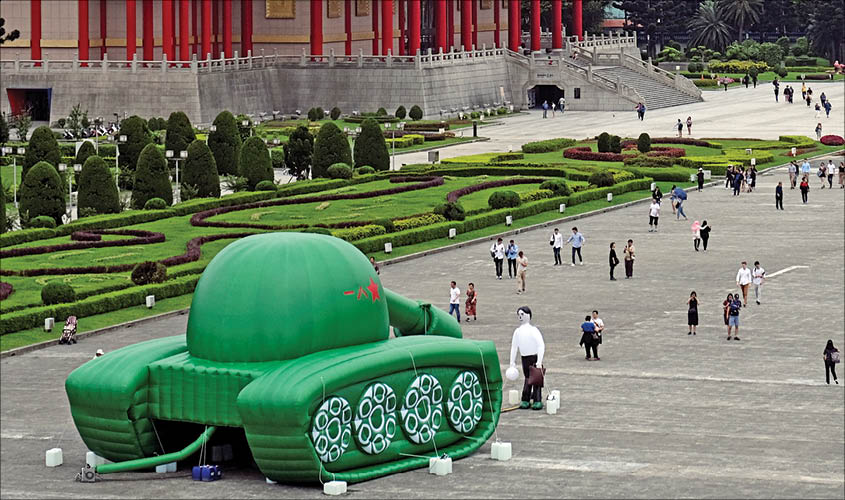Through open-door policy started under Deng Xiaoping, China became the world’s second largest economy.
The interview given recently by the Beijing-based author of the China Dream, Liu Mingfu, to the Japanese newspaper Asahi Shimbun and published on 28 May, is important. It comes in the midst of steadily growing tensions between the United States and China, with Washington making it explicit through various actions that these are way beyond a trade war and intended to stop China’s “rise” and prevent it from posing a challenge to America’s global pre-eminence. The tensions have severely impacted China’s technology sector, travel by Chinese scholars and students to the US and seen the initiation of espionage-related investigations linked to China by 56 offices of the FBI in the US—all when China’s economy is slowing down.
Liu Mingfu’s background as a retired Colonel of China’s People’s Liberation Army (PLA), who continues to serve as a professor at China’s prestigious National Defence University (NDU), lends significance to his remarks. His book China Dream, initially published in Chinese in 2010 and subsequently in English in 2015, has sold millions of copies. Liu Mingfu is well connected to China’s military “princelings”, with Lieutenant General Liu Yazhou, son-in-law of former Politburo Standing Committee (PBSC) member and President of China, Li Xiannian, writing the foreword to his book. Chinese President Xi Jinping has also made favourable references to the book.
Liu Mingfu made four very important assertions in then early 1,700-word excerpt of the interview published by Asahi Shimbun. Each has significance to the prevailing global scenario. First, dispelling doubts among some that any idea of China having a long term grand strategy is fanciful, he unambiguously declared that “the Chinese Communist Party does have a grand strategy”. He underlined the continuity in strategic thought of Chinese leaders. He said: “In the last years under Mao Zedong, even though China was still poor and backward, it was able to work together with the United States to create a relationship meant to keep the Soviet Union in place. Through the reform and open-door policy started under Deng Xiaoping, China became the world’s second largest economy. Such miraculous development would not have been possible without a grand strategy.”

Second, replying to whether “unification” meant China dusting off past historical geographic maps for use, Liu Mingfu clarified, “there have been major territorial changes over the 2,000 or so years from the Qin Dynasty to the Qing Dynasty”. Adding, “it is not clear what period would serve as the standard”, he asserted that “the map used by the current Chinese government is the clear standard for national sovereignty and territory”. This statement has definite implications for China’s neighbours. In India’s case, Chinese maps reflect China’s claims on Arunachal Pradesh, Ladakh and the entire state of Jammu and Kashmir is designated as “disputed”. China has also advanced territorial claims on other countries including Bhutan, Nepal, Japan and Vietnam in addition to maritime territorial claims over 3 million square kilometres of the South China Sea. Pertinent is that various senior national level Chinese Communist Party leaders have, over the years, regularly asserted China’s territorial claims, including on India. He did say, though with caveats, that “China’s consistent direction has been to resolve such issues in a peaceful manner through negotiations with the relevant nations”.
Replying to a specific question about unification and Taiwan, Liu Mingfu was categorical that Xi Jinping will “work actively on the Taiwan issue and achieve ultimate unification of the nation while he is in office”. Making implicitly clear that this was aimed at the US too, he added “it is inconceivable that China would abandon its goal of unification because it feared possible intervention by the United States”. Stating that “for the United States, Taiwan is nothing more than one card” and there is “low possibility of any military intervention by the United States that might lead to all-out war”, he added, China will effect unification by military means only when it can deter US intervention.
Finally, Liu Mingfu, while elaborating the “China Dream”, reiterated the goals spelt out by Xi Jinping at the 19th Party Congress in October 2017. He said to create a prosperous nation means “completing the great reconstruction of the Chinese people by 2049”, which is the centenary of the founding of the People’s Republic of China. “The goal is to surpass the United States in overall national power in terms of the economy as well as science and technology.” Next is to create a strong military so that China’s military strength exceeds that of the United States. The final part of the “China Dream” is unification.
Liu Mingfu’s remarks would be intended to highlight China’s resolve and publicise Beijing’s determination to stand up to US pressure. It simultaneously seeks to raise the pressure on Taiwan and is a veiled warning to countries like Japan—which he calls a “client state” of the US—India and Vietnam. Viewed with other indicators it does, however, also point to Xi Jinping coming under increasing domestic pressure.
Jayadeva Ranade is a former Additional Secretary in the Cabinet Secretariat, Government of India and is presently President of the Centre for China Analysis and Strategy.

